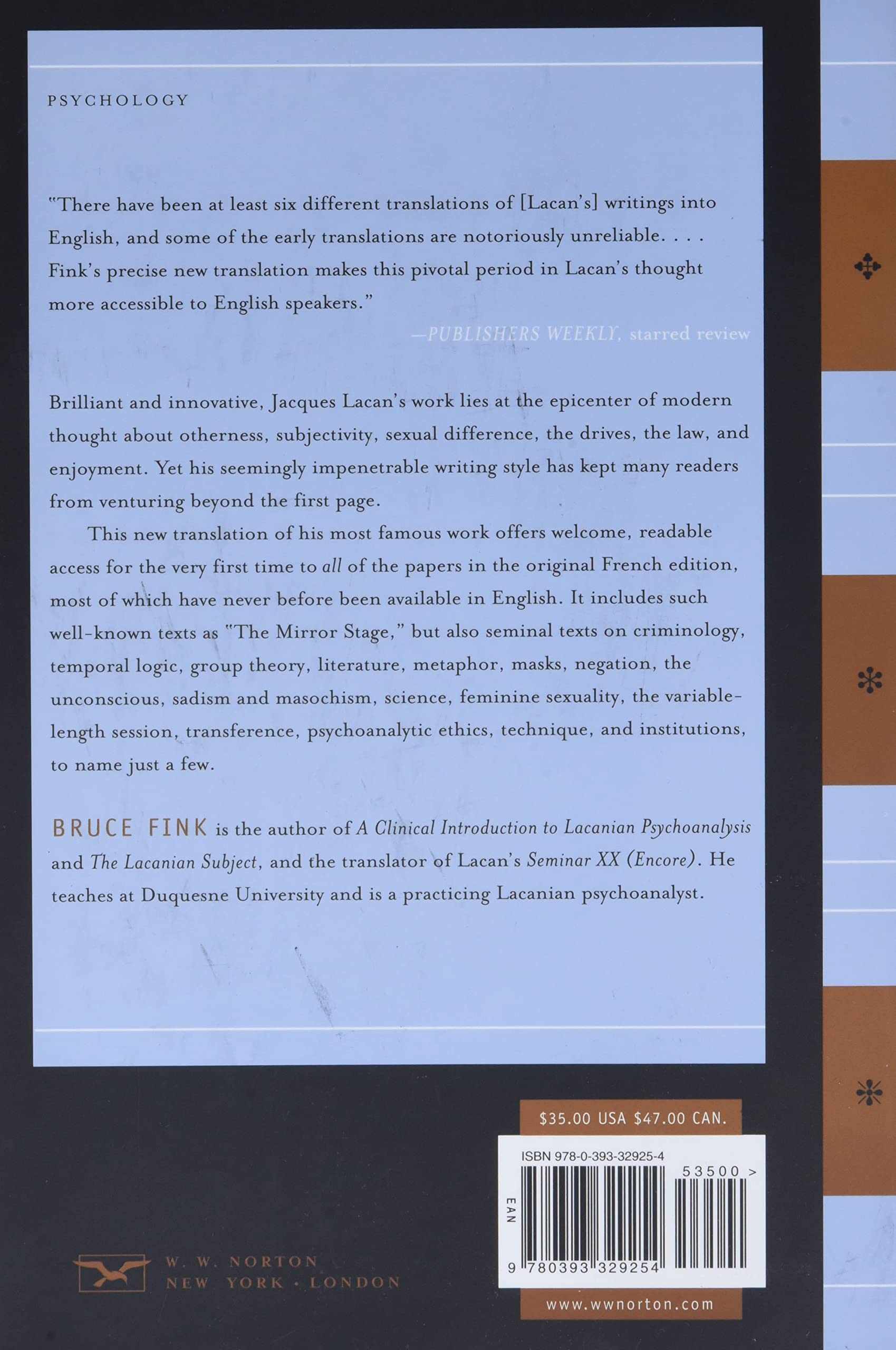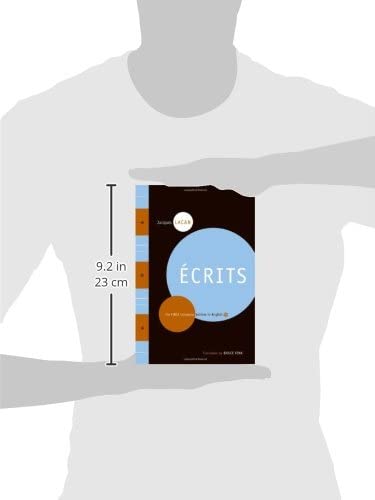





Écrits: The First Complete Edition in English
P**P
the wheel was like this before somebody invented the wheel
I was looking at two graphs from Lacan in The Sublime Object of Ideology by Zizek when I decided to see how well Lacan explained the kind of circular reasoning with short circuits in my copy of Ecrits. Just before Graph I (around pages 800-808 in the French page numbers in the margin) Lacan has a remark about the importance of understanding a death drive as part of Freud's understanding of life wanting to return to the inanimate objects that make up the world. Our ideas become ethereal in the string of unconscious trains of thought that do not get realized until the chain is quilted (Zizek offers a political set of alternative interpretations of class context from capitalist to Communist). For a set of books that rocked philosophy, I was also reminded of Nietzsche, which has a new set of complete works with Human, All Too Human (I) (1995) translated by Gary Handwerk now being joined be a second part, Human, All Too Human (II). Chapter 4 of the first part, From the Souls of Artists and Writers, ends with the kind of closing that recalls giving up:just as we have given up religion,but not the heightening of sensibilityand the exaltation acquired from it. (Nietzsche, p. 152).Perhaps never before has art been so profoundlyand tenderly grasped as now, when the magic ofdeath seems playfully to surround it. (Nietzsche, section 223, Twilight of art. p. 152).What I understand in great thinkers like Lacan can change from day to day, so I don't try to pinpoint an ideology like an intellectual pin-up girl who wants little girls to want to be me, but I can be amused by the tautology.
H**N
Good Product
Good Product
A**R
Five Stars
good
J**A
If you want to know what Lacan said, read what he wrote
To summarize the discussion that Lacan sustains in these book, I would like to share this quote of his ‘Écrits’:"Is the place that I occupy as the subject of the signifier concentric or eccentric in relation to the place I occupy as subject of the signified?” The point is not to know whether I speak of myself in a way that conforms to what I am but rather to know whether when I speak of myself, I am the same as the self of whom I speak.
J**.
Yep. Like totally.
Like, so intellectual that I'm going to keep you guessing, because you're never going to pick me up after you see the wopping 800 pages of guesswork you'll have to do. Because I'm French, and you can merely try to understand what I meant. I'm also going to draw these quasi mathmatical diagrams in the margins of my pages. I'll also draw the same doodles on a blackboard in front of a lecture hall wearing a coorderoy jacket, making you're head explode with intellectual intimidation. Because "I'm translated." You're going to spend years mastering French and then watch a video of me on youtube and still not comprehend what I mean. Yeah.
M**R
De-Centering the Subject
By the time that Jacques Lacan published Ecrits in 1966, he has already passed through a long apprenticeship first as a psychiatrist, then later as a psychoanalyst. Beginning with his earliest writings, mostly essays, Lacan made it clear that he would modify the collective theories of such assorted luminaries as Freud, Hegel, Jakobson, and Saussure. The first edition of Ecrits from 1966 contained his best and worst. Lacan was a spellbinding orator as his audiences from his Seminars would attest. He was less innovative as a writer, a failing exacerbated by various translation problems from French to English. Still, what came through clearly enough was his general thrust that implied far more than what he asserted positively. He was not bashful about attacking anyone with whom he disagreed, including the various American ego and French psychoanalysts who persisted in valorizing their whole or totalizing view of the speaking subject. The terms he uses are not meant to be definitional; rather they are the product of an evolving mind, one that like Derrida resists functional specificity. Their context, then, rather than their seemingly ingrained meaning, is the key to comprehension. The problem for his readers who had not attended Lacan's Seminars was that they lacked the verbal wizardry that inevitably accompanied their give and go. Readers new to Lacan were forced to read the New Critical way of close reading, a method that discouraged the very means that gave Ecrits its distinctive flavor.Of the essays that comprise all of the Ecrits, three are generally held as seminal: "The Mirror Stage as Formative of the I as Revealed in Psychoanalytic Experience;" "The Agency of the Letter in the Unconscious:" and "The Signification of the Phallus." Each of these three is deliberately dense, allusive, and just plain difficult. In "The Mirror Stage" essay, Lacan presents an image of the subject that was at distinct odds with many of his colleagues. One of Jacques Lacan's earliest published essays on the ego dealt with its formation in what he termed the mirror stage. As readers examine the seemingly neat trilogy of the three stages of ego development--the Real, the Mirror, and the Symbolic--they can be forgiven for thinking how symmetrical and how well-organized they appear. The truth is far more prosaic. Each of the three as they are now presented and studied was developed over a period of decades. During this time, each underwent considerable modification with first one being emphasized over the other two then in turn these others were similarly emphasized. At the time that Lacan first proposed the mirror stage in the 1930s, his focus had not yet incorporated the structural linguistics of Ferdinand de Saussure, who tended to see a vast web of language under-girding all of human social intercourse. It seemed reasonable for the pre-World War Lacan to set out a theory that could account for the birth and growth of the mental development of a child. Thus, Lacan tended to view his own theory as not much more than a historical marker delineating the very earliest stages of infantile psychological growth. After the war, Lacan read heavily in the growing field of structuralism and as a result decided to adapt several of its tenets into his own emerging interest in the ego. The more deeply that Lacan delved in this structural and psycholinguistic hybrid, the more he became convinced that he had failed to appreciate the extent of the importance that the growth of the ego in the child held for that child as he grew to maturity.In his "Agency of the Letter" essay, Lacan famously compares the unconscious to the structurality of language. Lacan begins with the startling admission that the unconscious is structured like a language. By this, he does not mean a particular language like French or German; rather he refers to the generic construction of any language that relies upon a logical ordering of its discrete parts. Prior to this speech, psychoanalysts generally credited the unconscious as being "merely the seat of the instincts." Lacan immediately asserts that this widespread notion by his peers "will have to be re-thought." He then introduces what he calls the role of the "letter" in this re-thinking. His definition of "letter" is unhelpful: "By 'letter' I designate that material support that concrete discourse borrows from language." A simpler definition would suggest that his letter is to be seen as the smallest, most basic unit of communication. He notes the commonplace that language has existed "prior to the moment at which each subject at a certain point in his mental development makes his entry into it." Those who use language--which is pretty much 99.99 % of humanity--should not confuse their use of it with the "various psychical and somatic functions" that its speakers use.And in his third essay, "The Signification of the Phallus," Lacan connects the tangled trio of mother, child, and father as the means to explain the psycho-sexual development of the speaking subject. Before Lacan says what the phallus is, he first goes through a lengthy litany of what it is not. It is not a fantasy. It is not an object. It is neither penis nor clitoris. He finally admits that it is a signifier whose sole purpose is to veil itself from even as it connotes itself to the functions traditionally associated with a bodily organ. Lacan pontificates the obvious with this redundancy: "For it is the signifier intended to designate a whole the effects of the signified, in that the signifier conditions them by its presence as a signifier." As far as the needs of the speaking subject are concerned, when this subject voices a demand, that demand returns to him as alienated. This alienation is funneled through the lens of the phallus of the Other. It is useful to recall that when a speaking subject invokes a phallus, that phallus is not his own; it belongs to some Other whose use of it triggers a response in the subject. It is precisely when Lacan discusses the phallus as a transferred simulacrum invoked by a speaking subject that most readers hit a wall of near-total opaqueness. Essentially what Lacan is really saying is that when a subject's demand returns as alienated, that alienation is repressed to the point that the subject cannot articulate the angst that he feels. The tightly packed angst ball of repression is what Lacan calls desire. Lacan has various adjectives (all nasty) to characterize desire: paradoxical, deviant, erratic, eccentric and scandalous. Lacan is quick to point out that the nastiness of desire is not "need "at all. Need is what a body must have to live, like food, water, shelter, and clothing. Lacan has harsh words for those well-meaning but erring psychoanalysts who insist on reducing desire to need. An often unacknowledged point about the phallus is not that it is a mere signifier, but that it is a privileged one. There are other human organs that relate to copulation or reproduction yet they do not emerge as an outstanding candidate. Perhaps the pun on "outstanding" is the very reason for its exalted state. It is only the phallus which can dramatically alter its appearance by elongation, a process which ties into a myriad of actions and reactions that hearken back to basic Freudian/Lacanian psychoanalytic theory. When the phallus becomes so well known that it encroaches upon the public consciousness as a source for humor (as in a Seinfeld sitcom episode in which the characters wondered whether cold water caused any "shrinkage") then that source clearly qualifies as privileged. Such speculation, both comedic and academic, implies that a privileged signifier is so privileged that it can seemingly take on a life of its own, to be detached from its source as it were. In this sense the phallus assumes the full faith and credit of human sexuality, a means of psychoanalytic currency exchange for the genders. To continue the financial metaphor, the phallus "dollar" cannot be spent, only borrowed. Thus, this leads to the value and function of the phallus from the triad of those concerned: the mother, the child, and the father. Each seeks the phallus but none can ever truly possess it. They can only think of it in terms of its relation to the Other. And in the world of Lacanian psychoanalysis, everyone is the "Other" to some other.
J**L
Mission impossible?
When you take an erudite French psychoanalyst, who is presenting his take on Freud's German by pressing it through the sieve of French semiotics, one can only hope for so much when that text is then further strained by being pressed into English. A number of these "writings" were originally lectures, meant to be experienced in Lacan's own idiosyncratic delivery (you can enjoy him on YouTube, if you're curious). All this is a way of saying reading Lacan in English is far from a simple or direct thing. Bruce Fink has probably achieved as close to a "clear" translation as the original will allow. One needs to acknowledge that there are concepts that are perfectly clear in French that are a muddle in English, so when you have someone as full of himself as Lacan, that gets pretty intense sometimes. Then Lacan will suddenly engage an unexpected metaphor, or display a moment of real wit, and you forgive his pretentiousness. An influential thinker, and for those of us who haven't mastered French, we can be grateful that Monsieur Fink chose to accept this mission.
A**J
Excellent!
J**T
WOW!!!
good
D**A
Thin Cover
The seller Couldtail needs to do a better job with packaging. Came in thin plastic envelope. Hence, severe dents at the edges. Only reason I decided not to return is the spine is still intact. Plus I paid just around 1000 rupees for this classic work.Paper quality and print are of high quality. But the cover is very thin. And the binding is not so robust. I have no doubt it will break midway through my reading.
M**L
Really good book
Acceptable price
A**R
Five Stars
Fantastic
Trustpilot
1 month ago
1 month ago